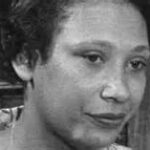 Mildred Loving was a Civil Rights activist in the 1960s. She and her husband successfully defeated Virginia’s ban on interracial marriage.
Mildred Loving was a Civil Rights activist in the 1960s. She and her husband successfully defeated Virginia’s ban on interracial marriage.
Mildred Delores Jeter was born on July 22, 1939, in Central Point, Virginia. The shy, somewhat soft-spoken woman became a reluctant activist in the Civil Rights movement of the 1960s when she and her husband, Richard Loving, successfully challenged Virginia’s ban on interracial marriage.
Mildred Loving was partially African American and Native American. Throughout her life, she referred to herself as Indian rather than black. Mildred’s family had deep roots in the area around Central Point, Virginia, where blacks and whites mixed freely with little racial tension even at the height of the Jim Crow era.
As a girl, Mildred was so skinny, she was nicknamed “Bean.” She was just 11 years old and attending an all-black school when she first met Richard Loving, a 17-year-old white high school student. Quietly, the two fell in love and began dating and when Mildred became pregnant at the age of 18, the two decided to get married.
Virginia’s Racial Integrity Act of 1924 (known as an anti-miscegenation law) barred the Lovings from marrying in their home state, so the couple drove 90 miles north to Washington, D.C. to tie the knot and then returned to their home in Caroline County, Virginia. They’d been married just a few weeks when, in the early morning hours of July 11, 1958, the county sheriff and two deputies, acting on an anonymous tip that the Lovings were in violation of the law, stormed into the couple’s bedroom.
Richard ended up spending a night in jail, the pregnant Mildred several more, and the couple eventually pleaded guilty to violating the Virginia law, which recognized citizens as “pure white” only if they could claim white lineage all the way back to 1684.
“Almighty God created the races white, white, black, yellow, malay and red, and he placed them on separate continents,” presiding Judge Leon M. Bazile ruled. “And but for the interference with his arrangement there would be no cause for such marriages. The fact that he separated the races shows that he did not intend for the races to mix.”
The Lovings’ one-year sentences were suspended, but the plea bargain came with a price: The couple was ordered to leave the state and not return together for 25 years. The Lovings followed orders. They paid their court fees, relocated to Washington, D.C., had three children, and only rarely made separate return visits to Virginia to see friends and family.
But by 1963, the Lovings decided they’d had enough. The Civil Rights movement was blossoming into real change in America and with a sense, perhaps, that this new era might lead the Lovings back to their old life in Virginia, Mildred wrote Attorney General Robert Kennedy to ask for his assistance. Kennedy wrote back and referred the Lovings to the American Civil Liberties Union (ACLU), which accepted the couple’s case.
On June 12, 1967, the high court agreed unanimously in favor of the Lovings, striking down Virginia’s law, and allowing and the couple to return home. The Court held that Virginia’s anti-miscegenation statute violated both the Equal Protection Clause and the Due Process Clause of the 14 Amendment. Chief Justice Earl Warren wrote the opinion for the Court stating marriage is a basic civil right and to deny this right on a basis of race is “directly subversive of the principle of equality at the heart of the Fourteenth Amendment” and deprives all citizens “liberty without due process of law.”
Richard and Mildred soon moved back to Virginia, returning to Caroline County, where they built a home and raised their children. Tragically, Richard was killed in an automobile accident in 1975, when his car was struck by another vehicle operated by a drunk driver. Mildred, who was also in the car, lost sight in her right eye.
In the years following her high-profile court battle, Mildred Loving did her best to put the past behind her, refusing most interview requests to talk about the case. A 1996 Showtime movie sparked renewed interest in the Lovings’ life, as did a 2004 book, but Mildred continued to shy away from the attention.
“What happened, we really didn’t intend for it to happen,” she said in a 1992 interview. “What we wanted, we wanted to come home.”
Still, there’s little doubt about Mildred and Richard’s legacy. There’s an unofficial holiday celebrating their triumph and multiculturalism, called Loving Day on June 12. More importantly, the prohibition against mixed race marriages has been stripped out of every state constitution.
Mildred Loving passed away from pneumonia on May 2, 2008, at the age of 68.


